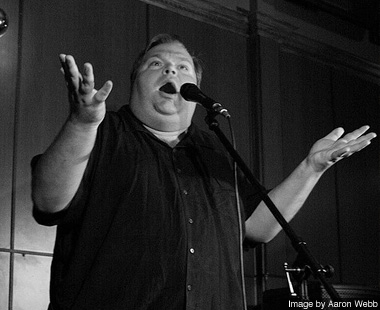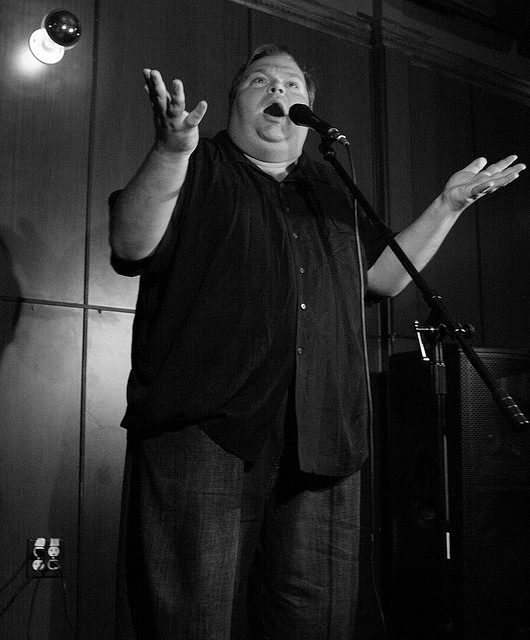I wasn’t going to write anything about the Mike Daisey affair — Grist’s own editor Scott Rosenberg said what needed to be said — but the tone of the subsequent coverage, the high dudgeon and hand-wringing and self-congratulation among American journalists and commentators, has rubbed me the wrong way. So, perhaps ill-advisedly, I’m jumping in.
Daisey did something as old as theater itself: manipulated facts in service of narrative. He rearranged events, put himself in scenes he never actually witnessed, and collapsed people into composite characters, all in the name of telling a gripping and meaningful story. That’s all fine, of course, if you’re just doing theater and the audience knows what it’s getting. The problem, as Ira Glass points out in This American Life‘s extraordinary retraction episode (and as New York Times media critic David Carr echoes), is that the people who went to see Daisey’s show, or heard it on TAL, were under the impression that they were hearing an exposé, a piece of personal journalism. They thought they were hearing about stuff that really happened to Daisey. And he let them think that, even encouraged them to. He shouldn’t have done that! (As usual, James Fallows puts it best.)
The costs of what he did have been well-rehearsed by now. He sacrificed his own credibility and dinged the credibility of This American Life. For many, that seems to be the end of the story. But I don’t think we can ignore the fact that he also achieved something worthwhile. He produced benefits unique to storytelling — not just that he made thousands of Americans aware of Chinese factory conditions (conditions even his critics concede are dismal), but that he made them care about it, at least a little. He elicited an emotional investment in a way that American “objective journalism” has difficulty doing.
Do the benefits outweigh the costs? If you could go back and erase the net effects of Daisey’s show, would you? The easy way to answer this dilemma is to pretend it isn’t one, to assert, as Max Fisher of The Atlantic does, that “by lying, Daisey undermined the cause he purported to advance.” If that’s true, of course we can condemn the entire affair with a clear conscience. But it just doesn’t strike me as plausible. The discussion over the plight of Chinese factory workers is now well underway, bolstered by pieces in mainstream media that appeared subsequent to Daisey’s show. I doubt the kerfuffle over Daisey’s personal experiences — which is mostly of interest to media nerds — is going to have much effect on that discussion. (At the very least, assertions to the contrary should be backed by some data or analysis, which I haven’t seen.) The awkward fact remains that Chinese factory workers have a moral claim on us and Daisey did real and pioneering work making us feel it. That achievement may be tarnished now, but it has not been erased.
It’s worth asking how to eliminate the costs of what Daisey did, how to tell his story without inaccuracies or better to calibrate audience expectations. But it’s also worth asking how to preserve and replicate the value of what Daisey did.
Journalists have been patting themselves on the back that they never make stuff up and can’t condone anyone else doing it. (Devotees of the last dozen years’ U.S. media will detect a whiff of irony here.) But they should also be asking themselves why it took Daisey to grapple with this issue seriously and create a vehicle for broader emotional engagement with it. (This is to take nothing from the great NYT investigative piece that came out after Daisey’s show.)
We could start by getting past the kind of black-and-white moralism of David Carr’s question:
Is it O.K. to lie on the way to telling a greater truth? The short answer is also the right one.
No.
Telling the literal truth is always and everywhere more important than telling a good story. So much for Hunter S. Thompson and gonzo journalism, I guess. But put that aside. Even taking Carr’s stricture as gospel, demonstrable lies — “I met an old guy with gnarled hands and showed him an iPad” when I didn’t — are an easy case. It doesn’t get us very far. There are more things under the sun than lies and truth.
It’s a weird and naive notion that there is a bright line between objective and subjective, fact and opinion, reality and narrative. Post-war journalism in the U.S. has been besotted with this kind of technocratic positivism, the notion that a reporter’s job is to convey facts and that anything else is personal opinion, bias, or outright deception.
But facts are not truth. Facts do not, in and of themselves, have meaning. Facts only add up to something — literally make sense — when they are embedded in some kind of framework or narrative that fits into our cultural identities and ways of seeing the world. That’s how humans are built to learn, going back to the Stone Age. So “telling a greater truth” is a thing of real value, not some theatrical pretense. Helping people understand and contextualize events, work through the meaning and resonance of the facts, is a humanistic endeavor, and in today’s fraught and complex world, there’s never been a greater need for it.
Much of the mainstream media seems to have forsworn that task. But “just the facts” is a pretense. There is no such thing. If the story, the narrative framework, isn’t explicit, it’s implicit. And if it’s implicit, it usually reflects status quo interests. I see no particular nobility in that.
So a lie isn’t OK in service of telling a greater truth. What is OK? How do we value the benefits of storytelling — meaning and resonance — relative to the benefits of precision and rigor? There are endless fuzzy borderline cases, bits of approximation, generalization, interpretation, or poetic license. It’s too easy to say there’s no tension.
The reason this tension is on my mind has to do, you won’t be surprised to hear, with climate change.
One of the striking things about climate change is that majorities of Americans accept it, on some level or other, but it is those who reject it, largely in the conservative base, who display the most intensity. They’re the ones who call their representatives and go to town halls and write letters to the editor and get in a reactionary fury over f’ing light bulbs. Why is that? One reason is that conservatives have been told a story. They have not been given science lectures by Al Gore and James Hansen, instructed on ocean pH and ice sheet volumes and parts per million of CO2. They’ve been told by their media outlets, analysts, and politicians what climate change means: It is part of the liberal plan to control your behavior and expand government. It is elite condescension, high taxes, and global governance. That’s a story that carries great emotional resonance for its audience.
What story have those outside the conservative base been told?
There is no such story. Or rather, there are several conflicting, obscure, half-told stories that don’t add up to anything. Americans don’t yet know how to make sense of climate change. We have access to the facts but we don’t yet understand the greater truths. That’s why it remains such an abstraction to most of the public and so absent from the passions and preoccupations of most American journalists and pundits.
Daisey sacrificed accuracy for meaning. Too much journalism does the opposite. We desperately need storytellers who can give the facts about climate change life and meaning, people who can get at those greater truths. Journalists could be part of that.




